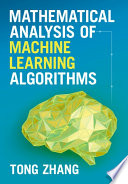

Most ebook files are in PDF format, so you can easily read them using various software such as Foxit Reader or directly on the Google Chrome browser.
Some ebook files are released by publishers in other formats such as .awz, .mobi, .epub, .fb2, etc. You may need to install specific software to read these formats on mobile/PC, such as Calibre.
Please read the tutorial at this link: https://ebookbell.com/faq
We offer FREE conversion to the popular formats you request; however, this may take some time. Therefore, right after payment, please email us, and we will try to provide the service as quickly as possible.
For some exceptional file formats or broken links (if any), please refrain from opening any disputes. Instead, email us first, and we will try to assist within a maximum of 6 hours.
EbookBell Team

4.4
102 reviewsMathematical Analysis of Machine Learning Algorithms 2023
This book overlaps several zlibrary categories, two of which are: "Computers - Algorithms and Data Structures", "Computers - Artificial Intelligence (AI)"
Chapters: • 1 Introduction • 2 Basic Probability Inequalities for Sums of Independent Random Variables • 3 Uniform Convergence and Generalization Analysis • 4 Empirical Covering Number Analysis and Symmetrization • 5 Covering Number Estimates • 6 Rademacher Complexity and Concentration Inequalities • 7 Algorithmic Stability Analysis • 8 Model Selection • 9 Analysis of Kernel Methods • 10 Additive and Sparse Models • 11 Analysis of Neural Networks • 12 Lower Bounds and Minimax Analysis • 13 Probability Inequalities for Sequential Random Variables • 14 Basic Concepts of Online Learning • 15 Online Aggregation and Second-Order Algorithms • 16 Multiarmed Bandits • 17 Contextual Bandits • 18 Reinforcement Learning • Appendices
Mathematical Analysis of Machine Learning Algorithms not only explains current algorithms but can also motivate principled approaches for the future. This self-contained textbook introduces students and researchers of AI to the main mathematical techniques used to analyze machine learning algorithms, with motivations and applications. Topics covered include analysis of supervised learning algorithms in the iid setting, analysis of neural networks (e.g. neural tangent kernel and mean-field analysis), and analysis of machine learning algorithms in the sequential decision setting (e.g. online learning, bandit problems, and reinforcement learning). Students will learn the basic mathematical tools used in the theoretical analysis of these machine learning problems and how to apply them to the analysis of various concrete algorithms.
This textbook is perfect for readers who have some background knowledge of basic machine learning methods, but want to gain sufficient technical knowledge to understand research papers in theoretical machine learning.